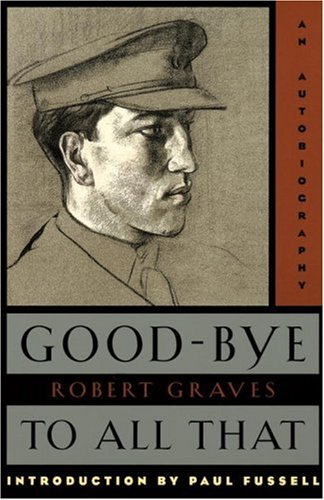I lucked in big time when perusing the penguin classic section of the Airport bookstore prior to a recent flight. I was tossing up between purchasing Meditations by Marcus Aurelius and Goodbye to all that by Robert Graves. As you’ve probably guessed from the title of this review, Goodbye to all that saw me through a long domestic flight. It is a haunting read.
Graves was born in England to an Irish writer and a member of a German aristocratic family. Schooled in a stereotypically horrible British boarding school, he passed up a scholarship to Oxford to enlist in the Army – against his better judgement – during the First World War. Commissioned into the Royal Welch Fusiliers, Graves fought in some of the bloodiest battles of the conflict. He wrote of his experiences in this autobiography in 1929, prior to fleeing Britain to live out his days in Majorca, writing poetry and historical fiction until his death in 1985.
This is not just another personal account of an average officer on the Western Front. This book has true power; it is terrifying, humbling and will make anyone who serves reflect on their own character. Graves shows himself as a soldier and a man, his strengths and where he was found wanting, how war grabbed theses weaknesses and left him irreducibly changed and unable to claw himself back. His story is a reminder that it is always better the devil you know, and the enemy is not always at the other end of your sight.
Graves’ writing prowess and classical literature background mean that he views the world, and his part in it, with a rawness and honesty that is lacking in many of the personal diaries or accounts of The Great War. He holds nothing back, laying it all bare. Gut wrenchingly recounting frequent suicides in the trenches, the agony of losing close friends, how individuals attempt to overcame loss, and his own florid experiences of PTSD.
Across his pages he portrays a strong counter-narrative to the myth of past fighting men as super-humanly stoic soldiers. War by its very nature achieves its ends through the destruction and suffering of humanity. It is a dirty business that changes all exposed to its grasp. For today’s officers and soldiers, living in the shadow of generations who apparently were more capable to grin and bear it, an unattainable character benchmark is set. This requirement to deny the horror of war in order to return successfully from it diminishes resilience. More importantly it opens the door for tossing aside the ethical foundation, which will be challenged, but must be held in order to return home and continue functioning.
I believe that Goodbye to all that should be on every junior leaders reading list because of its powerful message around the brutality and impact of war. The responsibility we have is one that I’m sure none of us take lightly, but once tested through war many of us will be changed. Graves’ work is one that will help us prepare ourselves and our subordinates for this test.
5 out of 5 poets in a trench
About the author: Nick Alexander is a current serving combat health officer and Associate Editor of Grounded Curiosity
Have you stumbled upon a powerful PME gem? Why not write a short review in order to share the lessons learnt. We’d love to hear from you via groundedcuriosity@gmail.com

